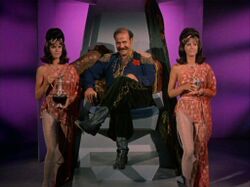Paradox
“Procrastination isn't the problem, it's the solution. So procrastinate now, don't put it off.”
A paradox is an utterance that looks as though it must be true or false at the same time, or neither, or force the utteror to travel in time, or something. For inexperienced wiki editors, paradoxes include simple contradictions, falsehoods, riddles, non sequiturs, and everything Oscar Wilde ever said.
The best of these editors will eventually refer to the most banal writing as profundity. So the reader can take heart in not arriving there yet.
Infinity Paradoxes[edit]
Paradoxes about infinity were invented by Achilles, and posterity regards him as a total heel. The archetype holds that a finish line a finite distance away can never be reached, because the intellectual on the way will spend an eternity thinking about the process. The most popular Infinity Paradoxes are as follows:
- Zeno's Paradox: If you want to win a race, have a head start. And it does not hurt to bring a gun and shoot the rabbit as he passes you.
- Toilet Paper Paradox: You will never finish a roll of toilet paper. The inventor of this paradox is honored around the world, but if you meet him, politely decline his handshake.
- Soda Paradox: If you start to drink, you will never stop. This paradox was used in the "Betcha Can't Eat Just One" campaign for potato chips, the first paradox ever employed in product packaging.
- Asshole Paradox: The more you piss me off, the more I kick your ass. Paradoxically, both participants are instead referred to as dicks.
- More Infinite than the other Paradox: If there are infinite numbers and there are also infinite prime numbers how can one be infinite if there are more of one than the other?
- The Kevin Bacon Paradox: The more movies Kevin Bacon makes, the more I want to slash my wrists. Is it possible to hack through the bone?
The essential point of the Infinity Paradox is to make infinity cuts into two slices of pie, using pieces of vanishing size, with which to prove that the smaller slice was bigger than the bigger slice. The professional philosopher goes on to induce you to accept the smaller slice. The modern application of this is the notorious "Zero-Scum Game." When used on nuts, it is called the Shell Game; or in America, "Form 1040."
WTF? Paradoxes[edit]
WTF? Paradoxes were unpopular until they were used in an episode of Star Trek in place of the plot. (That was the episode in which robots were used in place of William Shatner's acting ability.) The archetype begins by asserting that the following statement is true: The preceding statement is false.
So, your mission is not to accept the mission. Do you accept?
Similarly, the customer is always right. So if two customers say that the other is wrong, both are right, and therefore both are wrong that they are both right that they are both wrong that they are both right that they are both wrong. Da coda, foreva.
The case where the customer is always wrong is an anonymous editor who trolls you on a humor wiki. You show him why he is wrong and he replies, "This is a humor wiki, moron, so obviously I was kidding!" Which must also apply to his reply, which means his original post was serious again. Or not. Either way, we are here until the cows come home. Unfortunately, no cows edit humor wikis.
Now, if Pinocchio said his nose would start growing, would it?
Time Travel Paradoxes[edit]
“SNAKE! YOU CAN'T DO THAT! The future will be changed! You'll create a time paradox!!!!”
Most Americans spend all their spare time wrestling with the self-contradictions inherent in time travel, especially when watching an old re-run in which they know that they two lead characters get murdered the year after.
This type of paradox was also invented by a plot of a Star Trek episode. The one where the planetary Guardian sends them to New York City, where they make the starship go out of existence, but not themselves, who can stick around to repair the continuum and cut to a commercial. (Paradoxes are why the show is science fiction and not merely gadget fiction.)
A typical one of these paradoxes holds that if you go back in time and kill yourself, therefore you will not exist, therefore, you will not have killed yourself, therefore you go back in time and kill yourself, therefore you will not exist, therefore, you will not have killed yourself, therefore you go back in time and kill yourself, therefore you will not exist, therefore, you will not have killed yourself, therefore you go back in time and kill yourself, therefore you will not exist, therefore, you will not have killed yourself, therefore you go back in time and kill yourself. (Surely, the reader is now ready to do so.)
The Cheap Fantasy Novel Exposition Paradox is where something happened before the dawn of time, but "before" implies a linear time stream, so whatever happened couldn't have happened before linear time started.
By the way, if you go back in time and you rape your own grandfather, is that a crime if it occurs in Tennessee? Or merely the original reason the place is the way it is?
Philosophical paradoxes[edit]
There are many paradoxes in philosophy. In fact, sitting around thinking them up, while not the business of philosophy, is certainly its Lunch Hour. The first Philosophical Paradox was Russell's Paradox: If a barber doesn't cut his own beard, what does he cut? Yet, if he does cut his own beard, what does he cut? as there are no customers for a barber with a beard so ratty that it looks as though he cut it himself. Bertrand Russell first phrased this Paradox with reference to "predicates," but we now know he never cut his own predicate.
Among the other famous paradoxes in philosophy are the following:
- Pointless Paradox is, paradoxically, pointless.
- I'm Feeling Lucky Paradox: If someone doesn't know how to get to Google, how can they google it?
- Leprechaun Paradox: If two leprechauns find each other, which one would get the pot of gold?
- Omnipotence Parodox: Could Jesus microwave a burrito so hot that he himself could not eat it?
Philosophical Paradoxes occur in our popular culture; that is, the Top 40:
- Hotel California Paradox: If you can check out any time you want, why can you never leave?
- Rolling Stones Paradox: You can't always get what you want, but if you try sometimes, you just might find, you get what you need.
Chicken-And-Egg Paradoxes[edit]
The archetypal Chicken-And-Egg Paradox is the one concerning the chicken and the egg. It was invented by Yogi Berra ("No one ever goes there anymore — It's too popular!) The Chicken-And-Egg Paradox was neatly solved by the invention of the chicken quiche, but that has not detracted from its popularity. Its sub-paradoxes include:
- Glasses Paradox: You can't find your glasses in the morning, because you need your glasses on to look for them.
- Cups Paradox: You can't start the coffee brewing, either, because you are hardly awake before you get that first cup.
- Your Favorite Undiscovered Band Paradox: The band is good so people should listen to them. But once people start listening, they'll go commercial and they won't be worth listening to.
- Work experience paradox: You can't get work without experience, but you can't get experience without work.
The final paradox in this list will magically cease to be a paradox if Congress would just extend benefits to 99 weeks again, before the author's runs out.
Gay Love Paradoxes[edit]
Leaving for the moment the self-contradictions about wanting to take that thing and stick it there, the topic of homosexuality is fraught with paradoxes:
- Unrequited-Gay-Love Paradox: Say a gay guy is in love with a straight guy, and all he wants is a straight answer.
- Grelling-Nelson paradox: A heterosexual who is heterological wants the homosexual to be like him.
- Illicit Behavior Paradox: How can something so wrong feel so right?
- Shallowness paradox: If you dump somebody for being shallow, that makes you shallow.
- Brick In Wall Paradox: If you don't eat your meat, you can't have any pudding. How can you have any pudding if you don't eat your meat?
The final one belongs in this section only because it pertains to meat. It is Ellen Degeneres who argues on television that gays and Lesbians have a right to live free from paradoxes, mean looks, and bills in the mail.
The Spice Girls Paradox[edit]
“If you wanna be my lover, you gotta get with my friends.”
But then, wouldn't you be their lover? Anyway, assuming that they and the said friends all subscribe to the same rule (which is a safe assumption, given their hive mentality), the Spice Girls have no friends, anyway, besides each other. This suggests that the gullible fan-boy is not going to "get with" anyone tonight. Not that that's a new thing for him.
Physical Paradoxes[edit]
Undergraduate physics students learn the Infernal Civil Engineering Paradox, which holds that, if you agree to build a dam for Satan, then you are dammed if you do, damned if you don't. Other physical paradoxes include the following:
- Human Paradox: Mr. C. is a Supreme Allied Engineer, yet is obsessed with hotel toilets.
- Paradox Paradox: Can a universe exist without paradoxes?
- Forest Paradox: If a tree falls in the forest and there is no one around, would the other trees laugh?
- Wet T-Shirt Paradox: You cannot dry a wet T-shirt, as after it is dried, it is a dry T-shirt, not a wet one. This paradox has not dampened the appeal of wet T-Shirt nights at the Club.
- Recycle Bin Paradox: Where do you put your recycle bin when it is time for it to be recycled?
In the physics lab, students perform perverse thought experiments on Schrodinger's Cat, that poor pussy doomed to be science's sacrificial lamb. In a typical such experiment, Schrodinger's Cat is placed in a box with a solid but radioactive barrier and a container of poisonous gas. If the radioactive material does not deteriorate, the cat continues to live, especially if it has asbestos skin; if the radioactive material does decay, the cat dies from the poisonous gas. Such experiments formed the basis for the Salem Witch Trials.
Everything is a Paradox[edit]
Take the following theory: “There is a time and a place for everything.” That is, there is at least one case in which any given fact is true. Since this is a theory, it can be taught in Kansas public schools.
Therefore, by being true in at least one case, the statement has proven itself, and can be considered fact. Now, we apply this to the next two statements, “the world as we perceive it is true,” and “the world as we perceive it is false.” In at least one case, both of these statements are true, such that the world as we perceive it is at once both true and false. Therefore, everything about the world (and, by extension, the universe) is inherently contradictory. All of reality is a paradox.
It is not, either[edit]

There are many (perhaps an infinite number of) questions in nature to which there is no answer. Whether these questions are paradoxes, is simply one of them.
- Channel 1 paradox: There is no Channel 1 on the television dial. (Except in Britain, but that doesn't count, because all of life there is a paradox.)
- Lately, there is not even a television dial, only a clicker, and suddenly there is a
001on it.
- Lately, there is not even a television dial, only a clicker, and suddenly there is a
- The Paradox Basin of Arizona is a place where conspiracy theorists believe there is an alien base, but there isn't. Paradox Drive is in Fountain Hills, Arizona, which is nowhere near. Why?
Military paradoxes fit in this category of not really being paradoxes. (The technical term is "con job," like the list of patents invented by the Sudanese.) For example, the Lieutenant Calley Paradox: "We had to destroy the Vietnamese village, in order to save it." A generation later, it had arrived up the chain of command in time for George W. Bush to declare that there were WMD in Iraq. We'll never know for sure until we go in. Bush would later quip that he had to destroy capitalism in order to save it. (This cleared the way for Barack Obama to finish the job for the sheer joy of it.)
The famous French Civil War is another notorious Military Paradox, because both sides immediately surrendered. À propos of that, the combatants emigrated to Exeter, New Hampshire, which became the birthplace of the Four-Way Yield.




